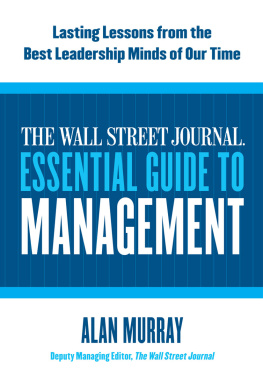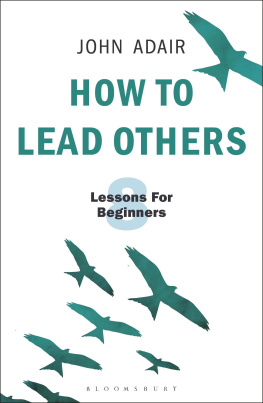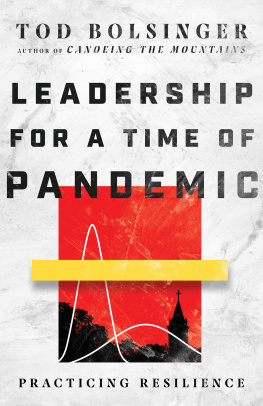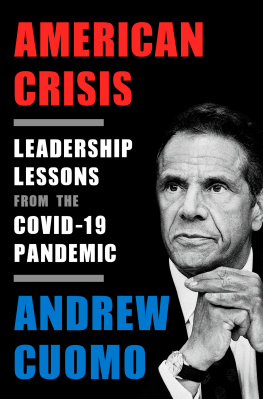

Copyright 2021 by Johnathan Nightingale and Melissa Nightingale
Published by Raw Signal Press
www.rawsignal.ca
We build better bosses.
For corporate/event bulk orders, contact
21 22 23 24 25 5 4 3 2 1
This work is licensed under the Creative Commons Attribution
NonCommercial-ShareAlike 4.0 International License.
http://creativecommons.org/licenses/by-nc-sa/4.0/

Deposit, Library and Archives Canada, 2021
ISBN-13: 978-0-9959643-2-7 (paperback)
ISBN-13: 978-0-9959643-3-4 (ebook)
To C, L, J, S, and B, all of whom
made cameos on work calls this past year.
May you enjoy in-person schooling
for years to come.
Contents
Introduction
We already know what theyll say.
When people write books about the impact of the COVID-19 pandemic on business, theyll talk about it as an accelerant. Theyll talk about how it was a year that pulled the future forward. Remote work and remote conferences and remote weddings. Massive changes to consumer habits and the retail landscape. Lasting impacts to housing, travel, and tourism. Theyll talk about how disruptive it was.
And somewhere, in the fourth paragraph of , theyll acknowledge that it was a hard year. Maybe theyll use a word like turmoil, or stressful, or burnout.
This is a book about that word on .
There is no way to talk about what happens next without standing in what the past year has been. But that wont stop folks from trying. Many of the business books about COVID-19 will be retrospectives, narratives constructed after the fact to help us make sense of a time that made no sense at all.
This is a book about what it felt like to live through it. Not a neatly packaged set of observations, gleaned from the benefit of hindsight. Its a snapshot. Of what it felt like to lead. And manage. And parent. And live. Set against a backdrop of ever-changing public health guidelines and complicated trips to the grocery store.
We had already been writing our newsletter for years when the pandemic hit. Every other Wednesday we try to put something helpful into the world for bosses something that makes you reflect and, if we really nail it, get more intentional about the way you lead.
Bosses are not the most lovable group of people from the outside. We are often underskilled, and when we make mistakes, the impact on our teams can be really painful. But underskilled isnt a permanent state. And thats the core of our work.
People arent born knowing how to manage and lead a group in a work context. And if they arent born knowing it, that means its learnable. If you want to know why we sound optimistic, even on the heels of what the past year has been, thats why.
In our experience, most bosses want to be better. The vast majority want to do right by their people but struggle to figure out how and find little support along the way.
This book is a year of love letters written to bosses throughout a global pandemic: 27 letters, from the first lockdowns to the first anniversary of those lockdowns.
At the close of the book, we talk about the mass renegotiation that is underway right now. How people are rethinking their relationship to work, and how organizations are racing to catch up. That renegotiation also has us feeling optimistic.
Wherever this finds you, we hope were collectively in a better spot. A better spot around the virus, of course, but also around work and life and balance and boundaries. And, most importantly, around how bosses show up for their people.
Our Job
Now Is
To Flatten
the Curve

Were breaking our format this week. It wouldnt help to tell you what Melissas reading and what Johnathans reading. Were all reading the same thing. The COVID-19 coverage feels like its everywhere, and its overwhelming. If it feels that way for us, it probably feels that way for many of you, and for the people in your organizations. Its a lot. And as bosses, we have to do some really important work, starting right now.
First, a bit about where we are. Neither of us is a doctor (or an epidemiologist!), but the American Hospital Association is just crawling with those types of folk. When they had an expert on a few weeks ago to give a best guess epidemiology for the U.S. in the next little while, they got this:
96,000,000 infections
4,800,000 hospitalizations
1,900,000 ICU admissions
480,000 deaths
What is hard to grasp, though, even from Big Scary Numbers like that, is what it means in lived experience. Yesterday a doctor from Bergamo, Italy, wrote about how things have changed for his city over the last week. Its harrowing. And it leaves no ambiguity about the lived experience.
But when we look around at the smartest minds in the room, closest to the problem, they sure do seem unanimous. Some bad stuff is coming.
And so weve been thinking a lot about flattening the curve.
Since The Economist published the phrase flatten the curve three weeks ago, its been the best advice weve found for bosses who ask us what they should be doing. We cant cure the virus (were not doctors! or microbiologists!), but we can control how quickly it spreads. That matters, because every system has a breaking point, and we should want our health care systems to stay on the happy side of it. As bosses, there isnt much we can do to shrink the curve. But there is a lot we can do to flatten it.
Some of this is easy, like making sure your office has soap and sanitizer available. Suspending family-style lunches is probably smart, too. We recommend cancelling the apple-bobbing contest altogether. Anything you can do to minimize obvious opportunities for spread will flatten the curve.
Some of this is harder. Telling people to work from home when theyre sick is great, but please think carefully about what support they need. Some of your people may feel like they ought to stay home, but if theyre hourly and that means lost wages, you put them in a difficult situation. If leadership tells them to work from home but their own boss penalizes them for it or pressures them to stay, youre not going to succeed in flattening the curve.
There are people doing this right. Microsoft does not have a great history of treating their employees well, particularly women, but their leadership on this point is worth following. and its a good template if you need one. The later phases of their guide include some scary questions. What happens if schools close? What happens when an employee is infected? However unwelcome those thoughts are, we would so much rather you think about them now than wait to react in the moment when they happen.
Some curve flattening is going to be pretty painful. We run events. And you may have noticed that event people are having a hard time. In the days leading up to Betterboss, we were keeping very close tabs on public health recommendations. We wanted to know whether we would have to cancel. We didnt, thankfully, but had we been a month further into this, we think we might have. That kind of cancellation would hit us hard. And every day were seeing another SXSW, GDC, or Mobile World Congress announce a cancellation that hits their communities just as hard or harder.














